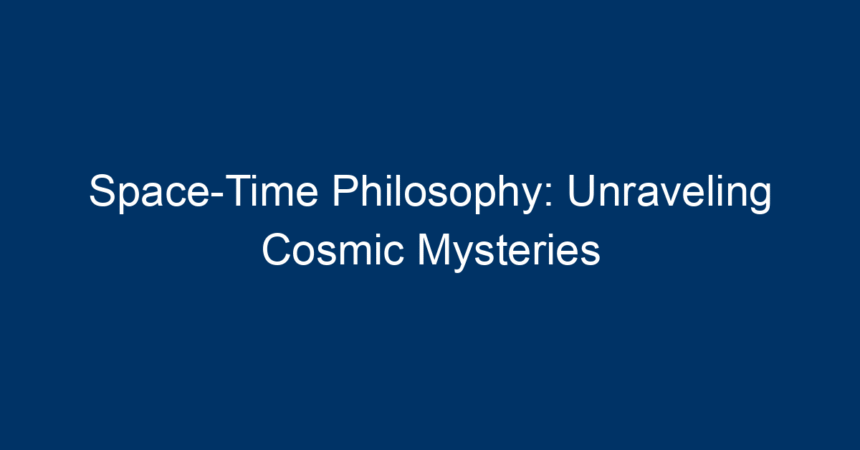In the grand tapestry of the universe, two concepts stand as pillars of modern physics: space and time. Yet, their intricacies extend beyond mere dimensions; they weave a narrative filled with philosophical inquiries and cosmic mysteries. This exploration—often termed space-time philosophy—strives to understand the fundamental nature of reality. In this article, we will delve into the essence of space-time philosophy, its historical context, its implications for our understanding of the universe, and its impact on contemporary philosophical dialogues.
The Foundations of Space-Time Philosophy
What is Space-Time?
Space-time is fundamentally the fabric of the universe, integrating the three dimensions of space with the dimension of time into a singular four-dimensional continuum. This revolutionary concept emerged from the works of physicists like Albert Einstein, who proposed the theory of relativity. According to this theory, space and time are not independent but are interwoven, affecting how we perceive events in the universe.
Historical Context: From Newton to Einstein
The journey of understanding space and time began with Sir Isaac Newton, who viewed time as an absolute entity, flowing uniformly regardless of the observer’s position. However, in the early 20th century, Einstein’s theory of relativity shifted this perspective, introducing the idea that time could bend and stretch depending on speed and gravitational fields. This marked a seismic shift in our philosophical understanding.
As we traverse through history, philosophers like Kant and Leibniz also grappled with the nature of space and time. Kant proposed that these concepts are innate structures of the mind, while Leibniz argued they are relational, only existing through the interactions of objects. These debates paved the way for modern inquiries into space-time philosophy.
Unpacking Space-Time: Philosophical Implications
Is Time an Illusion?
One of the most provocative questions in space-time philosophy is whether time is an illusion. Prominent philosophers such as J.M.E. McTaggart have posited that time may not exist in a linear fashion, suggesting that the distinction between past, present, and future is fundamentally flawed. This leads to the intriguing consideration of time in metaphysical terms, questioning its very essence.
The Nature of Reality: Are Space and Time Concrete?
Another compelling discussion revolves around whether space and time are concrete entities or merely frameworks we use to understand our experiences. Some contemporary thinkers argue that space-time does not exist independently of observers, echoing Leibniz’s relational view. This debate delves into questions concerning quantum mechanics and the limits of our comprehension of reality, challenging the very foundations of physics and philosophy.
Causality in Space-Time
Causality—the relationship between causes and their effects—plays a crucial role in space-time philosophy. The principles of causation, drawn from the linear progression of events in time, face scrutiny under relativistic models where simultaneous events may not be universally perceived. The implications of this inquiry are profound, as they affect ethics, determinism, and free will.
Contemporary Philosophical Dialogues
Quantum Mechanics and Space-Time
In recent decades, theories surrounding quantum mechanics have intersected with space-time philosophy, further complicating our understanding. The concept of entanglement challenges our conventional notions of distance and interaction, suggesting a non-locality that transcends classical interpretations of space and time. This crossover invites philosophical contemplation over the nature of reality itself and whether our classical intuitions serve us well in a quantum realm.
The Holographic Principle
One of the most fascinating developments is the holographic principle, which proposes that the entire universe may be encoded on a two-dimensional surface, with our three-dimensional experiences emerging from these encoded data. This radical standpoint encourages a reevaluation of notions of space and time, positing that they may not be fundamental, but rather emergent properties of deeper structures.
The Role of Space-Time Philosophy in Society
Technology and Innovation
Understanding space-time also has practical implications, especially in technology and innovation. The principles derived from space-time philosophy bear upon advancements in fields like GPS technology, where accurate timekeeping is crucial for determining position. As our grasp of space-time philosophy deepens, it lays the groundwork for future innovations that could reshape our technological landscape.
Ethics of Time Travel
The philosophical ramifications of time travel offer another intriguing perspective. If time travel were possible, it would raise ethical questions regarding causality, responsibility, and the nature of existence. Space-time philosophy invites us to consider the moral implications of altering past events and how such actions could affect our understanding of reality.
Conclusion: Insights and Actions
Space-time philosophy stands at the frontier of human understanding, bridging the realms of science and ethics, affecting how we navigate existence in our daily lives. As we explore these cosmic mysteries, what can we glean?
-
Encourage Open-Mindedness: Embrace the uncertainty and complexity of space-time philosophy. The universe is an intricate puzzle, and recognizing our limited understanding can broaden our perspectives.
-
Foster Interdisciplinary Dialogue: Promote conversations between philosophers and scientists. Collaborative engagements can yield richer insights into the nature of reality.
-
Engage with Technology: Stay informed about how advancements in physics can influence technology and society. The relationship between science and everyday life is rooted in space-time principles.
- Reflect on Existential Implications: Contemplate the profound questions posed by space-time philosophy. How do our beliefs about time and space shape our lives, decisions, and ethical frameworks?
As we unravel the cosmic mysteries through space-time philosophy, we not only seek to understand the universe but also our place within it. The journey continues, fueled by curiosity and the quest for knowledge.




